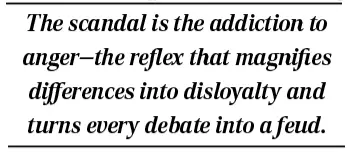The political season has returned, and with it comes the pageantry of partisanship. In Greenwich, however, where government is closest to daily life, we should remind ourselves of an unfashionable truth: the republic begins not in Washington, but at the sidewalk’s edge. Local politics ought to be about schools, sewers, snowplows, and parks.
The Board of Estimate and Taxation (BET) is the fulcrum of that local governance. This twelve-member body—six Republicans and six Democrats—sets the mill rate, oversees appropriations, and manages the town’s $600 million budget. Its architecture is balanced by design. No party can govern alone; cooperation is not optional, it is essential. It is a system meant to temper zeal and encourage moderation.

Recent years, however, have shown how fragile that design can be when met with the modern habit of rancor. Campaign literature and advertisements have begun to sound less like Greenwich and more like Washington—full of accusations, exaggerations, and demands for party-line purity. Some insist that any deviation from the party chorus is betrayal. But politics at the local level was never intended to be an exercise in tribal solidarity. It was meant to be an exercise in judgment.
The record does indeed bear this out. In the past year, Republican members of the BET voted in unison on all but two occasions. Hardly the discord described by so many. The exceptions were not matters of ideology but of law: one concerning compliance with the Americans with Disabilities Act, the other funding required for Nathaniel Witherell, our town-owned nursing facility, in accordance with the Town Charter. In both instances, members voted their understanding of legal obligation. That is the proper work of representation.
Yes, the current chair was elected with six Democratic votes and two Republican, the result of an intramural contest among Republicans. What has transpired since has been grotesquely exaggerated. The BET’s proceedings, never perfect but generally sober, have been refracted through partisan lenses until they resemble the distortions of a carnival mirror. Republicans and Democrats alike have contributed to this misrepresentation, each bending half-truths to partisan purposes. The consequence has been a caricature of the board’s work, and all involved in this distortion should feel the reproach of conscience.
Greenwich has also witnessed, in recent memory, how leadership grounded in cooperation can achieve tangible results. A chairman of the Board of Education asked that once debate had concluded and a majority had decided, members would rally behind the decision so that work could move forward. He led that mission by example. That discipline—persuade before the vote, unite after it—enabled major school construction projects to advance and avoided the inevitable fire bombs and tantrums thrown by those who did not get their way. His simple observation that “if you bring everyone together, your productivity becomes exponentially greater” should animate all our boards.
The scandal in Greenwich politics is not disagreement. Disagreement is inevitable and often useful. The scandal is the addiction to anger—the reflex that magnifies differences into disloyalty and turns every debate into a feud. That style of politics belongs elsewhere. Here, in a town sustained by volunteerism, prudence, and Yankee understatement, it is alien. We are not enemies. We are neighbors who see each other at the market, at school concerts, on the sidelines of youth sports. It is absurd to conduct ourselves in Town Hall as if we were combatants in some national melodrama.
Greenwich politics should remain rooted in the concerns that unite us: how to educate our children, how to steward our resources, how to maintain the quality of life that drew us here.




